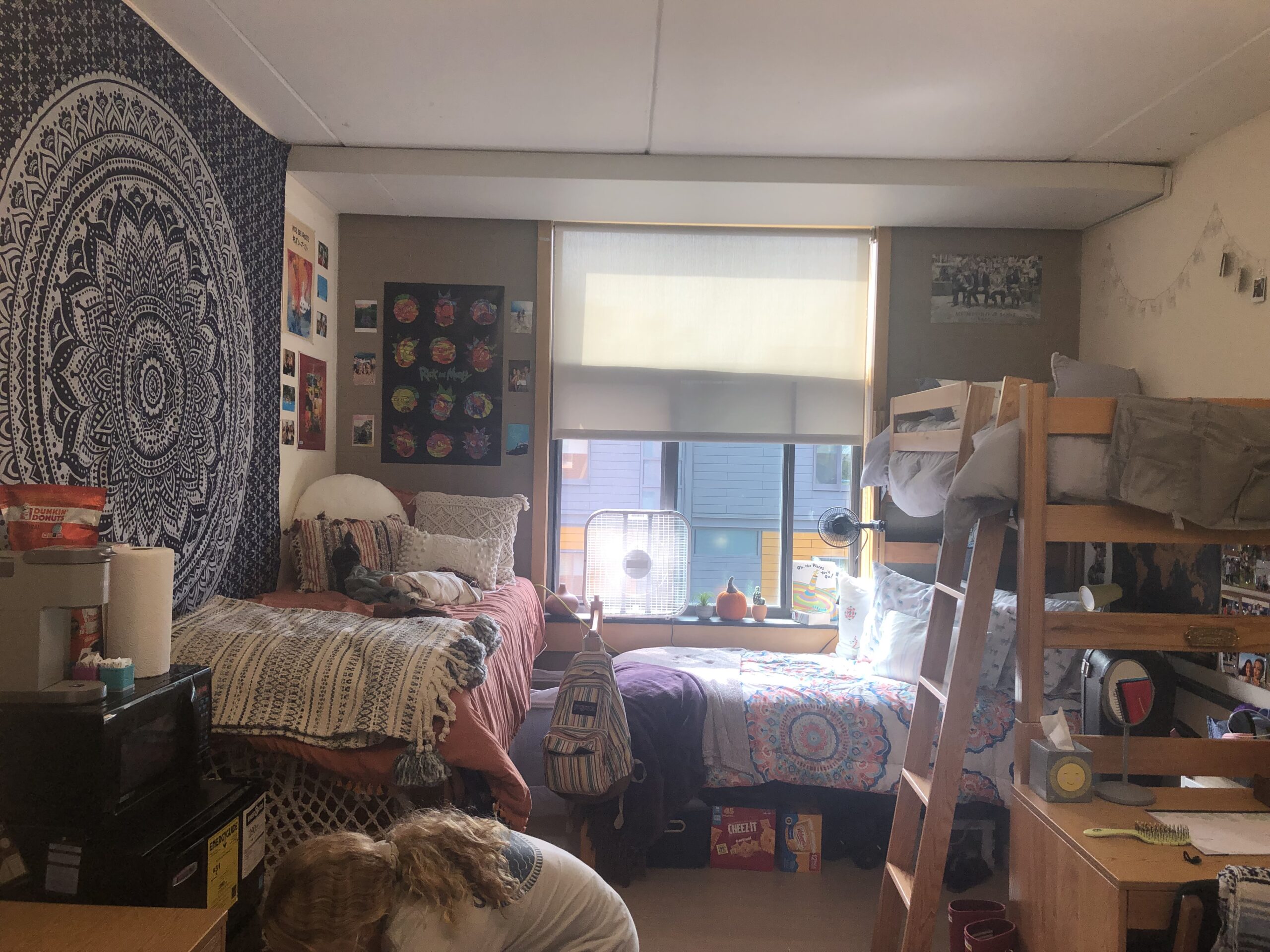COVID-19, housing crisis factors in decision
Pictured: Hillside hall as a triplet before the pandemic changed housing arrangements. PHOTO CREDIT: Maddie Bataille | Photo Editor
On Oct. 28, the University of Rhode Island sent an email out in regards to the housing crisis students are facing on and off campus.
In the email, Frankie Minor, assistant vice president and director of Housing and Residential Life (HRL), said that they will bring back triple-occupancy dorms for freshmen starting in the fall 2023 semester.
Minor said that COVID-19 greatly affected what housing looked like at URI.
“Prior to the pandemic, the way we manage demand, based on our supply, was based upon the use of triple rooms, primarily for first year students but also for some returning students,” Minor said. “We’ve kind of expanded our capacity with the same amount of buildings by using triples, and at our high point almost 70 to 80% of the incoming first-year students would be in a triple assignment and they received a 15% discount for the time they were doing there.”
Returning students who were offered on campus housing in triples were also given this discount. Then, Minor explains, the pandemic hit, and due to health and safety concerns, triples were no longer an option.
In fact, Minor said some doubles in residence halls were forced to become singles, which left URI with a total loss of 900 beds. Along with the loss of beds being offered on the URI campus, the ongoing issue in regards to the Narragansett Town Council’s three student housing ordinance has left students with fewer options than in past years.
Thus, Minor said that the renewed interest in living on campus was due to off campus housing being restrictive, and in turn, costly. This led to Housing and Residential Life’s decision to reinstate triple housing on campus which was the quickest short-term solution for.
“The people involved in this decision are folks not only at the department level,” Minor said. “But the vice president for Student Affairs and the president’s leadership team has been aware of these situations in either providing direction or providing endorsement of what we’re suggesting as the preferred approach.”
URI’s Student Senate has also been heavily involved in the housing situation especially in the past three years, giving a voice for the student body on what decisions should be made when it comes to where they will be living and what support they have from the University.
Minor clarifies, however, first and second year students are prioritized when it comes to on campus housing. Minor explained that many institutions encourage and even require students to live on campus in their first year as decades worth of data show that it improves their success during their time in college.
“When they are getting integrated into college and transitioning from high school to college, living on campus makes a difference,” Minor said.
According to him, Rhode Island also has the advantage of being a small state, which allows some students to commute, but about 94 to 95% of first year students at URI choose to live on campus, even though the University does not require them to live on campus in their first year.
Now that first and second year students have their housing mostly settled, third and fourth year undergraduates need options as well. This led to HRL discussing with the Student Senate on what would be a fair way to determine housing.
Minor explains that the new process is based on seniority, meaning the more credits one has, the earlier they would enter the process of selecting housing.
“So a student with 119 credits has priority over a student with 108 credits,” Minor said. “In any situation, there are going to be students who are advantaged and disadvantaged, based on what your criteria are, and from what the senior administration told us to do and what students are telling us to do this is the best combination of a practice that we can come up with.”
There are also students who may have a unique situation and these students may submit a request to the Adolescent Neuroscience Center for Health Resilience (ANCHoR) department, where requests like these are reviewed by the group in order to assist the students.
Sabrina Youn, a third-year student majoring in theatre with a concentration in acting, agrees that the triple housing should be implemented, but only for first-year students. She said that second-year students should have priority in doubles, and all remaining students priority in suite-style dorms.
“I live in Brookside and it is better than living in a dorm with two people because I get my own space,” Youn said. “I have a single, but I only have to share a bathroom so I can be by myself in my own room and I grew up sharing a room and do not want to continue doing that.”
According to Minor, about 90 to 95% of students at URI, unlike Youn, grew up having their own room. Thus, for first year students, this may be their first time sharing a space with someone else.
With over 1,000 students on the waiting list this year, HRL seeks to create long term solutions for the housing crisis.
“What we are exploring is can we replicate, potentially, with some modifications, the most recent hall that we constructed which is Brookside?” Minor asked. “We’re also looking at what type of housing do we need? Do we need apartments? Do we need suites? Do we need traditional double loaded corridors first year residence halls? We’re actually hiring a consultant to help us with that master planning process.”
Minor emphasized that the anxiety students may be feeling with housing is not falling on deaf ears. He says the University is exhausting all options to ensure that students have a place to live and sleep everyday while attending school.





